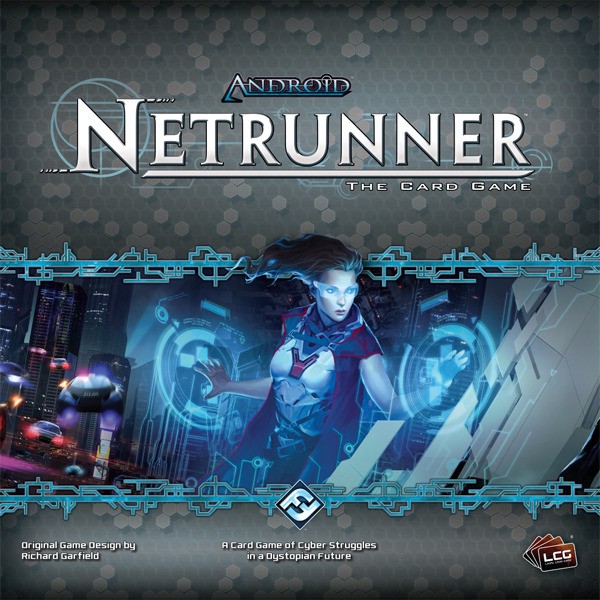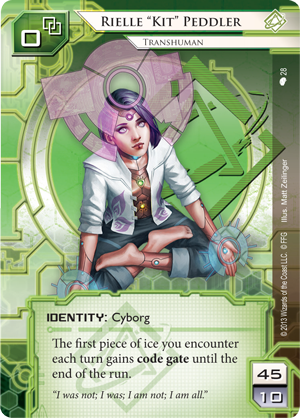Game review: Netrunner
Android: Netrunner by Fantasy Flight Games (FFG)
This game is pretty unique compared to most of the other games I play regularly. It is two-player only, and each player plays a completely different role with different rules and cards. The premise is that one player is an (evil?) corporation trying to advance their (nefarious?) agendas, and the other is a (mostly good?) “runner” (hacker) trying to steal those agendas.

The corporation has three “central servers” — a draw pile (named R&D), a hand (HQ), a discard pile (Archives). Then they can install “remote servers” where they have Assets or Agendas. Assets typically give you more abilities and agendas get you points. One of the things you can do on your turn is to advance an asset or agenda, and once it reaches its requirement, it becomes available to you. Once you’ve scored 7 points worth of agendas, you win.
To protect your servers from the runner, you install ICE. Different types of ICE protect against different types of attack and they have “subroutines” which do various things to the runner. Initially the ICE is played face-down, so the runner doesn’t see it until they first attack it. This means you often have to bluff with low-powered ICE. Different corporations have different strategies (as do the runners).
The runners have a similar set up with draw (Stack) / hand (Grip) / discard (Heap). I always forget which is Heap and Stack, try not to map them to the real terms because it’s just confusing. They install Programs, Resources and Hardware. Programs are usually “ICE Breakers” which attack a specific type of ICE, resources and hardware give them extra abilities (and sometimes capacity for more programs). A typical attack involves the runner having to spend credits to power up their various ICE breaker sufficiently to break various “subroutine” on a piece of ICE defending a corporation’s server. Some are optional (e.g. receive a trace), but some subroutines, if unbroken, will end the run.
There are four corporations (Weyland, NBN, Jinteki and Haas Bioroid) and three runner factions (Anarch, Criminal, and Shaper). I think NBN is just there as an in-joke for Australians. Both the corporations and the runner have an identity card, which gives them some base power. The expansions add new identities as well as new cards (assets, operations, agendas, events, ice, icebreakers), but no new corporations or runner factions.

Let’s get this out of the way — it’s not a simple game. There are a lot of rules, it’s easy to accidentally cheat by forgetting a rule, and you have to play several games before you’ll be able to play a game through without checking the rules. It’s not quite at the Race for the Galaxy level of difficultly, but close. The rules are mostly good, but it’s often hard to look up a specific rule, and some things are fairly ambiguous. This can make it hard to introduce new players. One example was that it took us a long time to figure out what happens to ICE after a server is accessed (and subsequently trashed/stolen). From looking on the BGG forums, seems that we weren’t alone. Turns out, the ICE (and upgrades) stay, which suddenly meant the corporation player started actually winning some games.
That said, you’re rewarded for learning it — it’s a brilliant game. You have to constantly think about strategy, and the game is very well balanced (which is incredible given how different the two roles are), so an early lead doesn’t translate into a sure win.
There’s a video intro from FFG on YouTube, but watch out — despite being called “Android: Netrunner — Complete Tutorial” it only covers the very basic rules.
I’ve never played Magic, but a lot of people who I’ve played it with say that it reminds them of Magic, and as it turns out, it’s by the same designer. Probably the main thing is that Netrunner is what FFG calls a “Living Card Game” which means you’re supposed to keep buying more expansion sets and continually customize your deck. The good news is that the cards in the expansions are really interesting, the bad news is that there are lots of them and they’re expensive. If you just start with the base game, there’s a huge amount of cards so you’ll have more than enough for a long time.
Netrunner has a quite a strong following. There are regular tournaments and a lot of fan websites discussing deckbuilding and strategy. I’ve just discovered that you can watch world championship games on YouTube. The game is technically called “Android: Netrunner” as it’s a reboot of the original “Netrunner” game from 1996 adapted to FFG’s “Android” universe. To that end, you’ll see some of the artwork in common with “Android: Infiltration” (another excellent game). Speaking of which, the artwork is beautiful. The cards also have a bunch of techno-gibberish background text which is occasionally hilarious.
The game comes in an enormous (Dominion-sized) box which is big enough to hold all the expansions. I’ve got my eye on this organizer from The Broken Token. At the moment I just have a smaller box with loads of zip-lock bags.
It can be quite a quick game — including set up and clean up, less than 45 minutes. We often play a couple of games in a row. If you’re always playing the same faction/corporation, and you’re reusing the same deck for deckbuilding, then the set up / clean up is basically nothing. Otherwise there’s a lot of time spent shuffling in the neutral cards (and removing them at the end).
In summary, this is probably my favourite game. You’ll be attracted to Netrunner if you like the if-this-then-that-what-if logical games. There are a lot of trade-offs, and you have to be willing to continuously update your strategy. It’s a lot like Race for the Galaxy in that regard, but where it differs is that the actions of the other player have a much more direct influence — I often feel that Race is a group of people playing Solitaire. There are a lot of players who don’t like games that require you to directly attack another player, and they probably won’t like Netrunner. Being a two-player game, it’s also not ideally suited for social board game events.